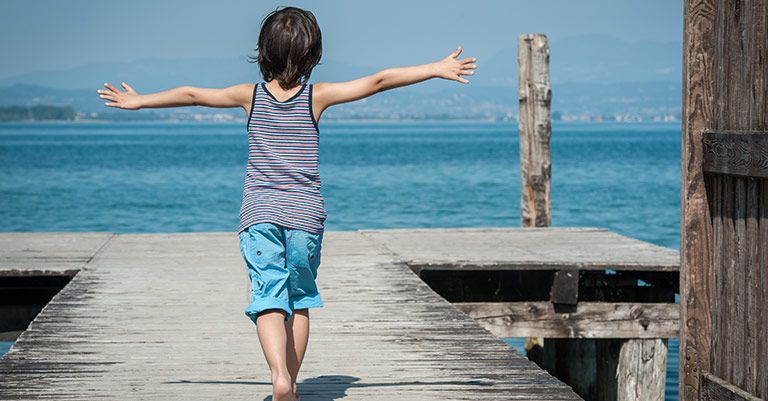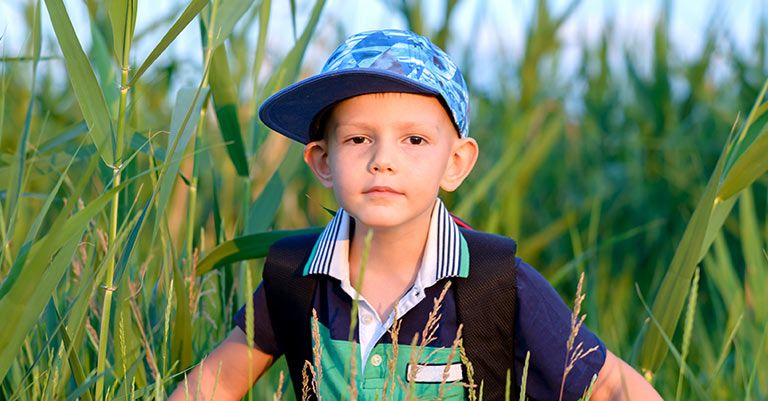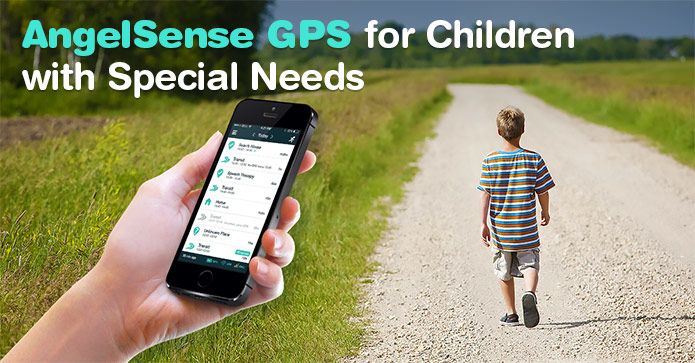10 Things You Can Do to Protect Your Special Child from the Dangers of Wandering
June 5, 2016A post by AngelSense, a GPS & voice monitoring solution designed for children with special needs.
Learn more about how AngelSense’s GPS tracking device brings peace of mind to parents and keeps children safe.
Autism affects millions of children and young adults around the world. For many parents what’s most challenging about the condition is their child’s tendency to wander off. In fact, wandering or elopement is so common among children with autism spectrum disorders that it’s estimated that more than half of children with the condition tend to wander off from safe places. While this behavior tends to peak at age 4, almost 30% of children with autism between the ages of 7 and 10 still wander.

Wandering can be dangerous and sometimes ends in tragedy. One report suggests that of the wandering incidents that caused parents to worry, 65% involved a close call with traffic while 32% almost ended in drowning. Wandering puts special children at risk of drowning, being run over or being harmed by a stranger. Avonte Oquendo and Kevin Willis, two teens with autism who drowned after wandering from safety, serve as a painful reminder of why more needs to be done to protect our children from the dangers of wandering.
Why do children with autism wander?
One of the most damaging myths is that children with autism wander because of inattentive or irresponsible parenting. This couldn’t be further from the truth. Children can wander from any setting including their home or school and even when under adult supervision.
Research suggests that special children wander for a variety of reasons. For some children wandering helps them cope with sensory overwhelm or anxiety. In these situations, a child might head for water as this tends to have a calming effect on an anxious child. However, for others wandering is something they do because they’re curious to explore or simply enjoy running. Some research suggests that 54% of special children wander simply because they love to explore.
Perhaps what’s most worrying of all is research which suggests that many special needs parents received no guidance or advice on how to manage their child’s wandering. This needs to change. It’s our hope that with enough awareness and collective action, we can prevent future tragedies from happening. We’ve put together some tips and strategies to help prevent wandering related tragedies.
1. Find a service dog for your child

Specially trained service dogs can help curb the tendency of children with special needs to wander. In addition to keeping special children safe, service dogs have been found to have a calming effect on anxious children. Typically the child would be attached to the dog using a special belt. The dog is trained to walk with the child, but to take orders from a parent or caretaker exclusively. If the child tries to wander, the dog will slow the child down, preventing the child from getting too far.
2. Add signs to all doors in your house
A combination of verbal and visual signs placed on each door at your child’s eye level can be a useful way to ensure your child thinks before they act. Some parents say that this technique is quite effective and more often than not, it helps dissuade their children from wandering. Something as simple as a red wait sign can be helpful when parents reinforce its meaning. When opening a door, a parent could point at the sign and say something like: “Remember, we can’t go until I say so,” or “Remember, you need my permission to go out there.”
3. Add chimes to doors
It’s easy to install door chimes on interior doors. These act as an alarm and will alert you when a door is opened. While you’ll still need to be vigilant, door chimes can be an effective alert system. This is also a very affordable and convenient option. Most hardware stores sell window alarms for a few dollars and they work well as a door alarm.
4. Secure all doors
Some special needs parents use slide bolts to secure doors. This isn’t always a good option and can make it difficult for other members of the family to open doors. Another idea is to simply install an electronic keypad which requires a code to unlock the door. Of course, the tricky part is that you have to ensure your child doesn’t learn the code.
5. Reach out to your neighbors
Your neighbors can play a big role in helping you keep your child safe. In fact, if you open up and confide in your neighbors you’re likely to find that most are empathetic and willing to help. One of the best ways to enlist their help is by printing flyers with a picture of your child and your contact details. When you hand these out, you can explain that if someone sees your child wandering around the neighborhood unaccompanied, they should call the number on the flyer immediately. In addition to added security for your child, this is also a great way to spread awareness about autism.
6. Get your child an ID bracelet
While ID bracelets can be a reliable way to keep your child safe, not all special needs children will wear a bracelet. If your child doesn’t mind wearing bracelets, you can include your contact number, your child’s name as well as information about your child’s condition. If your child is nonverbal, for example, a bracelet can be a good way to communicate this to strangers. For special children who struggle wearing jewelry, you can consider a temporary tattoo with your contact information.
7. Take your child for swimming lessons

Teaching your child with autism to swim will give them more confidence in water, and decreases the likelihood of drowning. Of course this doesn’t mean your child is safe in water. Remember it’s natural for panic to set in if your child falls into water even if they know how to swim. The hope is that knowing how to swim will give your child the tools to know what to do until help arrives. Swimming lessons for special needs children are on offer at most YMCA locations around the country.
8. Use glow stick during night time events
Hanging a glow stick around your child’s neck during an outdoor nighttime event makes it easier to keep track of your child. While this won’t prevent your child from wandering, it does make it easier to spot your child. Some parents also wear glow sticks so that it’s easy for their special children to find them when they feel overwhelmed or anxious.
9. Set outdoor ‘traps’

This is one of the best ways to use your child’s interest to prevent them from wandering too far. Find something that your child is fascinated by and place the object in strategic places in your front yard or the area around your apartment. This could be anything from pinwheels to garden gnomes. The idea is that should your child leave the house unaccompanied, they’ll see the object and spend time admiring or playing with it. This will stall your child, giving you some time to find them before they get too far.
There are many different tracking devices on the market which can help you keep track of your child. The AngelSense GPS is a non-removable GPS tracker that was specially designed for children with special needs and sensory sensitivities. It provides you with real-time locations updates and alerts and a listen-in option, so you always know where your child is and can easily sense their well-being. A GPS tracking device is not only an effective way to protect your child – it will also give you the peace of mind that your child is safe and secure.
How do you protect your special child from the dangers of wandering? Share your tips and suggestions in the comments below.
AngelSense is committed to creating a safer world for children with special needs while bringing peace of mind to their parents. With AngelSense parents can track their child’s location and well-being at all times and keep them safe. Non-removable GPS wearing, listen-in, real-time location updates & more. Try AngelSense today & Save 70%!



When AngelSense will be available in France?
What is the smallest tracker that you carry? I would like to sew the device into my grandson’s clothes.
I just purchased an AngelSense tracker for my 10 yr old grandson. He is on the Autistic Spectrum and non verbal this gps is amazing. Joey went with his father (who only sees Joey on weekends) to a wedding out of state. We were able to track his every move.Both parents and grand parents fell Joey is much safer having this device on him. Thank You Angle Sense, you give us peace of mind.
Thank you for sharing this with us!
Does anyone know exactly how big In size the Angel Sence tracker worn by the child is ? I have a 5 year old soon to be 6 autistic child entering ” mainstream ” 1st grade also does the school allow these to be worn by the child in school ?
I have the device, it’s about 3″ by 2″, and comes with a special pouch u can put the device into, and special magnetic locks that u have a key for, so u can lock it safely in place on anything u choose. Also makes it easier to transfer from one outfit to another.
I am so glad we had a little backpack with a harness and tether when our son was little. He would bolt away so fast, I would have been trapped at home without it. I clipped the tether to my pants so if he twisted out of my hand, he was still safe. He liked the weight when we put something in his backpack and the harness too, win win. I noticed how much more attentive he became when exploring outside and enrightment, aquarium, zoo, museums, hikes, parks. All of this was possible again. He couldn’t climb in the wild animal exhibits or bolt in front of cars. It saved his life and my sanity many times. He is diabetic too and he took off any ID I put on him.
They will take gps off and throw it out. Unless it is fixed into a piece of clothing. They are wearing. Best bet is medical alert will get ID bracelet for them. If they take off. It will happen.
Hi Kat,
For wearing options you can see here: https://support.angelsense.com/wearing/ The AngelSense GPS device comes with a fabric sleeve used to house the device and attached to clothing or a belt accessory under clothing using strong pins (similar to anti-theft clothing tags) and can only be removed using the special magnetic key that we include in the starter kit. Hope it’s helpful!
Kind regards,
Sidra Collins
Are they water proof???
Hi Ali, we are working on a waterproof cover and should have it ready in the next month! In the meantime they do come with a silicon cover and will work if they get wet – just not submerged in water.
Kind regards,
Sidra Collins
Try AngelSense Risk Free
FREE DEVICE
See PlansSession Changed
Your session has changed. Please close this tab.